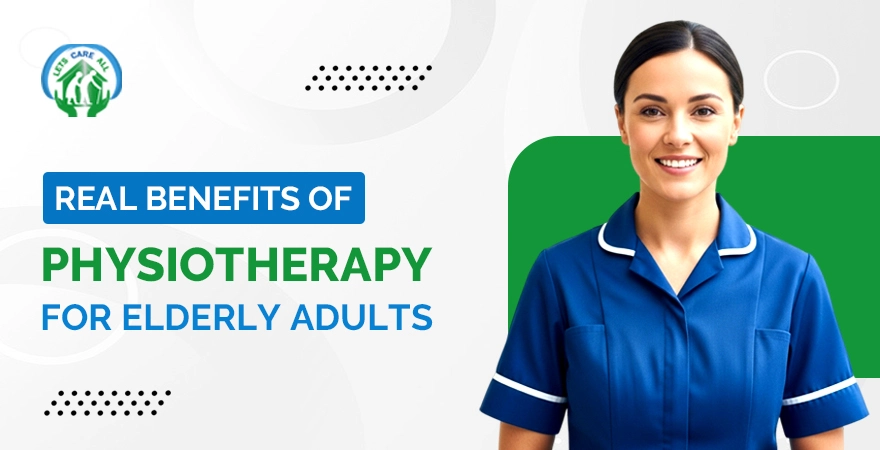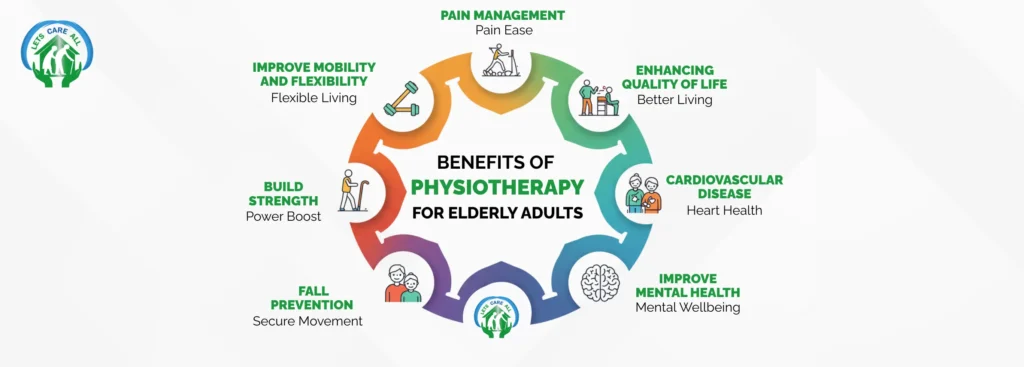- Southall, London
A call can make a DIFFERENCE
- Southall, London
A call can make a DIFFERENCE
A call can make a DIFFERENCE
Getting to Know Us!
Company Information and Customer Policies

As we age, our bodies naturally undergo changes that can cause discomfort, stiffness, and reduced mobility. While these shifts are a regular part of life, they don’t have to define how we live. Physiotherapy offers a way to navigate these changes with greater ease and confidence. It focuses on maintaining the body movement, addressing discomfort, and supporting overall physical health. For many older adults, it becomes a valuable part of staying active and connected to the activities they love. The ageing process may be inevitable, but with the proper support, you can approach it with strength and resilience. Ready to discover how physiotherapy can transform the lives of seniors? Keep reading to learn the real benefits of physiotherapy for elderly adults in detail:
Physiotherapy plays a vital role in helping older adults maintain independence, mobility, and overall comfort as they age. Geriatric physiotherapy for the elderly at home focuses on the specific needs of ageing adults and effectively addresses common challenges such as arthritis, stiffness, muscle weakness, and balance problems. Moreover, research indicates that 39.1% of older adults live with arthritis and 45.8% with hypertension conditions that often restrict movement and cause persistent pain.
Through personalised exercises, manual therapy, and movement training, physiotherapists reduce pain, strengthen muscles, restore flexibility, and enhance daily functioning. Furthermore, these interventions improve confidence, prevent falls, and encourage active participation in everyday activities. Consequently, older adults not only experience relief from discomfort but also enjoy a better quality of life, increased independence, and long-term mobility.
Elderly physiotherapy is much more than a treatment option. It’s a proactive approach to health, worth considering sooner rather than later because early action can prevent minor aches or mobility issues from turning into bigger health problems. It’s a way to take control of health before problems become too severe, and it can transform how seniors move, feel, and function in daily life. Let’s explore the benefits that can keep you moving with confidence.

One of the most noticeable benefits is improved mobility and flexibility. Ageing can make joints stiff and muscles tight, which limits movement and makes everyday tasks harder. In one study, older participants who received regular physiotherapy experienced a mean pain reduction from 5.09 to 2.95, along with noticeable improvements in mobility and functional independence. Physiotherapy programs focus on suitable exercises to stretch muscles and increase the range of motion. Over time, seniors can walk more easily, reach for objects without strain, and navigate stairs without fear of losing balance.
Maintaining muscle strength is essential for older people to perform daily tasks like walking or lifting objects. With age, muscles naturally lose mass, a process called sarcopenia, which can leave older adults feeling weak or easily fatigued. Physiotherapy handles this through strength-building exercises specialised to each person’s ability. As strength returns, so does the energy to participate in activities, whether it’s gardening, shopping, or simply enjoying a stroll in the park. This improved endurance often leads to a more active, satisfying lifestyle.
Better balance and fall prevention are another outcome. Falls are a leading cause of injury among older adults, and they can result in extended hospital stays or permanent mobility loss. Physiotherapists address balance problems through specific exercises that train coordination and core stability. As balance improves, the risk of falling decreases, allowing seniors to move with greater confidence both inside and outside the home.
Pain management is one of the main reasons many seniors turn to physiotherapy. Conditions like arthritis, osteoporosis, or back pain can make daily life uncomfortable. Instead of relying solely on medication, physiotherapy offers hands-on techniques, posture adjustments, and movement-based therapy to reduce pain. This approach not only lessens discomfort but also helps prevent further joint or muscle damage.
After surgery or injury, many people wonder what are the benefits of physiotherapy in their recovery process. Physiotherapy plays an irreplaceable role in helping you heal from hip or knee replacements, fractures, or even minor injuries that might otherwise take much longer to recover from without guided rehabilitation. Skilled physiotherapists assist in rebuilding muscle strength, restoring joint movement, and preventing stiffness. This guidance allows for faster and more complete recovery, ultimately improving your quality of life and helping you maintain independence.
Physiotherapy can even support cardiovascular and respiratory health. Gentle aerobic exercises incorporated into sessions strengthen the heart and lungs, which is especially valuable for seniors with heart disease or chronic respiratory conditions. You might wonder what are the benefits of physical activity for elderly people? Improved circulation and breathing not only boost overall physical health but also make daily activities easier and more enjoyable.
The benefits of physiotherapy extend beyond physical health. They extend to mental and cognitive well-being, lifting mood, easing anxiety, and reducing depression. Physical activity increases blood flow to the brain, which supports memory and thinking skills while lowering the risk of dementia. Participating in physiotherapy can also lift mood, ease anxiety, and reduce depression, providing a sense of upliftment and optimism.
How do you begin physiotherapy and maximise its benefits? Choosing the right physiotherapist and understanding what to expect can transform your experience and results.
The benefits of physiotherapy for elderly adults extend far beyond simple pain relief. They help seniors improve mobility, build strength, and maintain balance, supporting independence in daily life. Engaging in guided exercises and movement programs strengthens both body and mind, reduces the risk of falls, and promotes overall well-being. Adopting physiotherapy as part of a regular health routine allows older adults to stay active, confident, and fully engaged in the activities they enjoy. With consistent care and personalised guidance, the benefits of physiotherapy for elderly individuals transform how they move, feel, and live each day.
